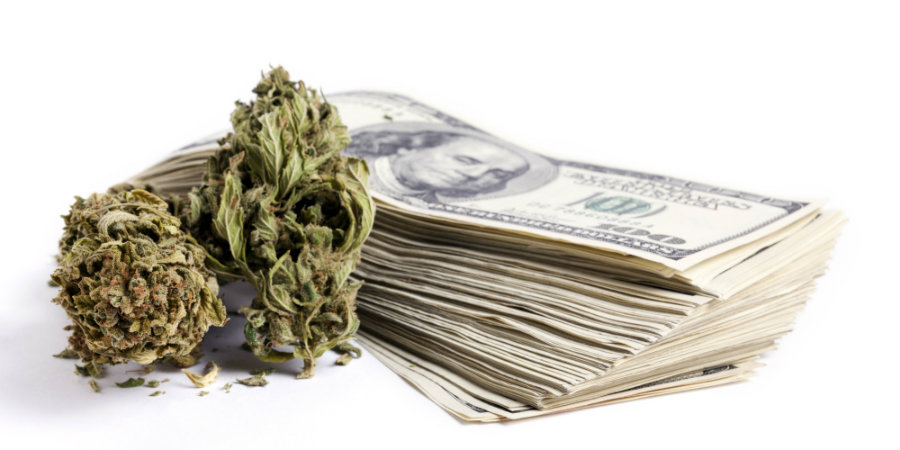A new study, published April on Health Affairs, found that a national medical marijuana program would save Medicaid for up to $1 billion a year. A father-daughter team conducted the study, that last year published another study that found Medicare prescriptions for painkillers, antidepressants, and anti-anxiety medications dropped in states that introduced a medical marijuana program.
The previous study left some questions unanswered, as the researchers looked only at data from Medicare, and they could not affirm the same for younger patients. However, with the newest study, Ashley Bradford and W. David Bradford from the University of Georgia applied the same analysis to prescriptions under Medicaid, which covers low-income people of all ages.


The results were as expected, and researchers found that Medicaid prescriptions for some drugs dropped significantly in states that passed a medical marijuana law.
Medicare could save $1.1 billion in prescriptions if nationwide marijuana program were established
The Bradfords found that anti-nausea prescription fell by 17 percent, antidepressant prescriptions fell 13 percent, and prescriptions for seizure and psychosis drugs fell12 percent. The researchers note that not everyone who has access to medical marijuana opts for it, but enough patients are doing so and it shows on the percentages.
“Patients and physicians in the community are reacting to the availability of medical marijuana as if it were medicine,” said the researchers, according to the Washington Post.
The research found that prescriptions for painkillers dropped by 11 percent, a significant feat as opioids-based painkillers are behind much of the current drug overdose epidemic. The Bradfords said that the introduction of medical marijuana laws coincides with a drop in painkiller prescriptions.
The study gathered data only from prescriptions made under Medicare and Medicaid, but the Bradfords believe similar drops have occurred with patients on private insurance plans. They estimate that because of the significant decreases in prescription rates, a nationwide medical marijuana program could save taxpayers over $1.1 billion on Medicaid prescriptions every year. Also, in their previous study, they estimated half a billion on Medicare savings if a nationwide medical marijuana program was established.
The costs would not disappear, but they would be shifted over to seniors and low-income people who would purchase medical marijuana instead, outside of their insurance programs. However, the biggest problem within the marijuana industry is that it is still classified as a Schedule 1 drug –the same as heroin- and it is illegal on a federal level.
As marijuana is illegal on a federal level, marijuana companies have to face some disadvantages. Such include having no access to banking services –as it would be illegal to own a bank account for an illegal product revenue- and having to pay tax on their gross profits instead of net profits, as they cannot deduct taxes as a regular business can.
The Trump administration seems to oppose legalizing medical marijuana anytime soon, and even though Donald Trump has been for patients having access to medical marijuana in the past, Attorney General Jeff Sessions has said he is against the legalization. Furthermore, the U.S Drug Enforcement Agency (DEA) had an opportunity to deschedule or reschedule marijuana as a Schedule 1 drug last year but chose to keep its status, as they believe that further clinical studies on the drug are needed.
Jeff Sessions told Colorado Governor they’re not ‘cracking down’ on marijuana-legal states
On Wednesday, Colorado Governor John Hickenlooper met with attorney general Jeff Sessions, and the governor said he believed the Trump administration would not “crack down” on states that have legalized marijuana.
“(Sessions) didn’t give me any reason to think that he’s going to come down and try and put everyone out of business,” told Hickenlooper to MSNBC.
Sean Spicer warned “greater enforcement” of federal laws in February, and Sessions said that he’s not a fan of the expanded use of cannabis and that he’ll enforce federal laws in an appropriate way. However, Hickenlooper told MSNBC that Sessions is a strong supporter of states being laboratories of democracy, and he added that the Attorney General already has his hands full with the opioids crisis and harder drugs, along with implementing Trump’s agenda on immigration.
Sessions allegedly told the governor by the end of their meeting that they had not shown signs of cracking down, and the governor agreed. Now, analysts believe that Sessions is unlikely to enforce federal laws against marijuana businesses in states where cannabis is legal.
The Cole Memorandum rules the Justice Department’s approach to cannabis, a 2013 mandate from the Obama administration, which stipulates the Justice Department place a low priority on enforcing marijuana laws against organizations and business that comply with state law. Sessions ordered the Justice Department to review the Cole Memo earlier this month, and Hickenlooper said that state-legal marijuana business should be clean to avoid upsetting the Justice Department.
Source: Madison
